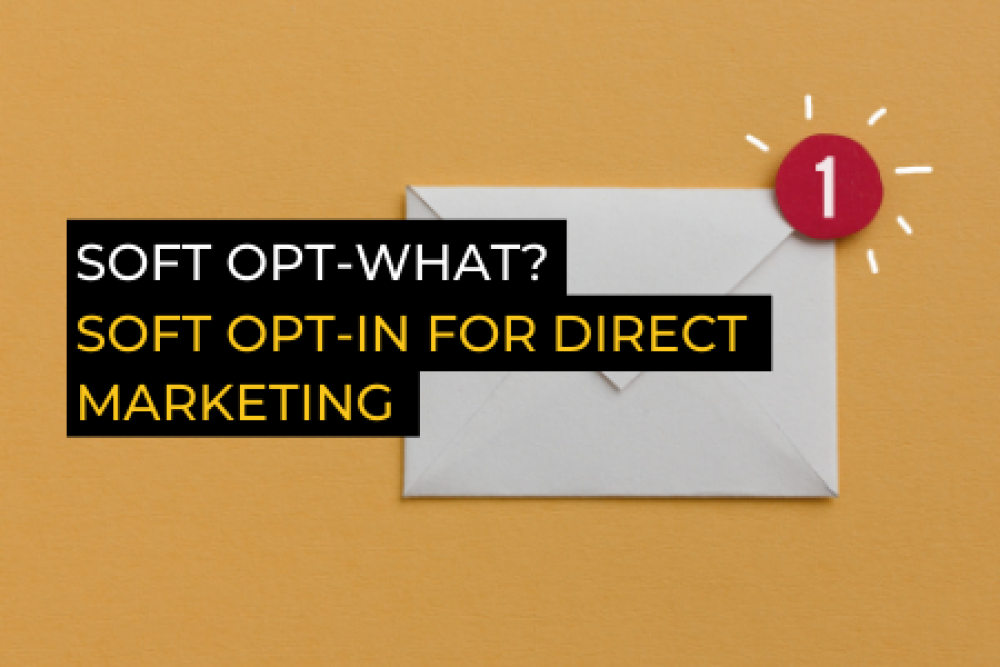Soft Opt-what? Soft opt-in for direct marketing
09 Aug 2021

PECR – four letters that are the bane of some marketers’ lives.
The Privacy and Electronic Communications Regulations (PECR), as the name would suggest, control businesses’ use of electronic communications. However, they make marketers’ jobs particularly hard because the rules around direct marketing are especially stringent.
In a previous article, we discussed the difference between marketing, service, and market research messages; the different rules that apply to each type; and the consequences of failing to follow them. Here, we focus on the rules around Business-to-Consumer (B2C) marketing messages and, more specifically, the circumstances in which you can market directly to consumers without gaining their consent. Now, you may well be thinking “What? That can’t be done.” But yes, in certain circumstances, it can. How? With soft opt-in.
Soft Opt-in
Consent in the context of PECR has the same requirements as under the GDPR - it must be specific, informed, unambiguous, and be able to be withdrawn easily and at any time. Now, when thinking about sending direct marketing messages to B2C consumers, it is drummed into us that you must gain the recipients’ consent. And this is generally true, however, there is a little exception to this rule that enables direct marketing to be sent to existing customers that have not necessarily explicitly consented to it – known as the ‘soft opt-in’.
Now, whilst undoubtedly useful, this exception does not mean that you can bombard anyone who has ever shown any interest in your organisation with every marketing campaign that you produce. Several factors limit the scope of this exception, and should be explored further:
1. The meaning of ‘existing customer’
To qualify as an existing customer in the context of soft opt-in, an individual does not need to have actually purchased something from your company before. Instead, merely ‘negotiations for a sale’ must have occurred, meaning that the customer must have actively expressed an interest in making a purchase. An example of this may be where an individual has contacted you asking for a quote or more details about a specific product or service. It is not enough, however, to simply enquire about your opening times, contact details, or other things that are perhaps ancillary, but not specifically about, making a purchase.
The line between what constitutes actively expressing interest and what does not is not entirely clear, but there must be a positive action taken by the customer to show their intent to buy. Simply browsing is not enough to trigger soft opt-in. So, for example, a customer merely looking at your website would not be enough. But, if that individual puts an item in their online basket and then fails to check out, this shows clear intent to buy, resulting in them becoming eligible to receive direct marketing via soft opt-in.
2. Similar products and services
Once you have determined that someone is an existing customer, this does not mean that they should now be sent all your direct marketing communications from every campaign. The exception will only apply to marketing communications about products and services that are similar to those that they have shown interest in previously.
What ‘similar products and services’ means will depend upon the context. For example, a supermarket could reasonably send out marketing communications to existing customers about a wide range of items that are commonly sold in supermarkets such as groceries, toiletries and pet food. However, in contrast, it would be unreasonable for an estate agent to send marketing communications about its 4-bed houses up for sale in Cambridge to existing customers who have engaged with them to look for 1-bed flats in London.
In its guidance on this topic, the Information Commissioner’s Office (ICO) explains that it is ultimately about asking yourself whether the existing customer would reasonably expect to be contacted about the product or service in question.
3. Opportunity to opt-out
A final important point to note is that to be able to rely on the soft opt-in exception, you must give the existing customer the opportunity to opt-out:
- When their details are first collected; and
- In every marketing communication thereafter
As the ICO explains, you cannot assume that just because an individual has actively engaged with your product or service that they will be happy to receive marketing communications from you. Therefore, whilst you do not have to get clear opt-in consent, they must be given an option to opt-out. When first collecting the customer’s details, this could be achieved by adding an opt-out tick box to an online contact form or, if details are being collected in-store or over the phone, the customer should be provided with the opportunity to opt-out verbally. Following on from that, all emails should contain an unsubscribe link, enabling the customer to easily opt-out at any time.
Conclusion
Whilst narrow in scope, this little exception to the rule on consent for B2C direct marketing is important to be aware of because, as marketers will attest to, gaining consent for direct marketing can be somewhat of a challenge. However, if you do decide to use this exception as a basis for sending out direct marketing communications, you must ensure that the additional conditions discussed above are met. To do this, effective CRM system management will be required to ensure that your records concerning customer engagement and marketing preferences remain accurate and up to date. After all, failure to do so could cost you a hefty £500,000 fine.





Please login to comment.
Comments